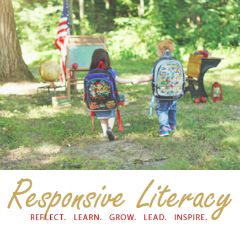I walked into a classroom the other day during Reading Workshop, and the kids were all spread around the room reading independently. I had to pick someone at random to sit down and confer with, but that is so hard to do! Then, I saw it.... A book that I LOVE. The choice was made for me. I had to sit down and read with the little girl who was reading The Little Mouse, the Red Ripe Strawberry, and the Big Hungry Bear. I just had to. Why? I love that book.
A few years ago, the second grade decided to be our favorite book characters for Halloween. I chose the little mouse. I had discovered the book that year, and had instantly fell in love. I used it to teach inferring characters feelings. I used it to teach voice in writing. I used it to teach fluency. I used it to teach problem and solution. I used it to teach a variety of compression strategies. I know that sounds repetitive, but I used it to teach a lot of things. I didn't realize it then, but it was a mentor text.
Mentor Texts are books that the students have read, know well, and love. They are powerful examples of good writing that we can use as models for our own writing, or are texts that we can use to practice new strategies with. Our mini lessons in both reading and writing (and math) can be strengthened by using pieces of texts that the students know well and love. It will help them really "see" what you want them to see. This will help transfer to independence with the application of the strategies you are presenting.
What mentor texts should you use? Well, there are lists everywhere. The Calkins units provide us with some, and any google search on mentor texts will give you many possibilities. Just remember- the kids are supposed to know them well. You can't have 50 different mentor texts that they know well. Use some texts that you can keep coming back to all year long, for a variety of reasons. If you are planning to do that, pick books that you know and love, too! Whether or not The Little Mouse, The Red Ripe Strawberry, and the Big Hungry Bear is on a list of mentor texts somewhere, I would use it anyway.
I found two great ways to organize the mentor texts that you find, and I linked them below. The first one is a Pinterest page, where she had a Board all reserved for her mentor texts. If you are on Pinterest, that is a great way to manage your resources. The other is a simple blog list of texts that she loves, with the strategies/skills that she teaches using the book listed beneath the cover.
http://www.pinterest.com/mrsest/mentor-texts/
http://www.julieballew.com/A_Literate_Life/Mentor_Texts.html
Use the books you love to make your students love to read and write!













